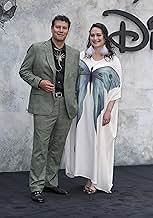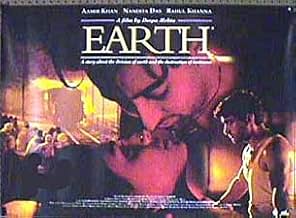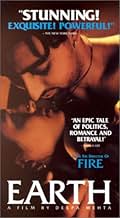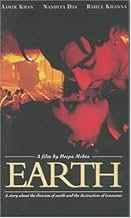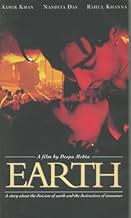Ajouter une intrigue dans votre langueIt's 1947 and the borderlines between India and Pakistan are being drawn. A young girl witnesses tragedy as her ayah (nanny) is caught between the love of two men and the rising tide of poli... Tout lireIt's 1947 and the borderlines between India and Pakistan are being drawn. A young girl witnesses tragedy as her ayah (nanny) is caught between the love of two men and the rising tide of political and religious violence.It's 1947 and the borderlines between India and Pakistan are being drawn. A young girl witnesses tragedy as her ayah (nanny) is caught between the love of two men and the rising tide of political and religious violence.
- Réalisation
- Scénario
- Casting principal
- Récompenses
- 3 victoires et 2 nominations au total
- Hariya
- (as Raghuvir Yadav)
- …
- Butcher
- (as Pavan Malhotra)
Avis à la une
As Parsees, India's "invisible" people, Lenny's wealthy family is supposedly sheltered from the growing conflict by an ever-fragile 'neutrality'. Lenny's naïvety is used quite effectively to endear her to the viewer. Her innocence makes the tragedy of Partition even more profound. The events occurring are incomprehensible to Lenny; her naïvety is best illustrated in the opening scene, in which she breaks a plate and, utterly perplexed, enquires "Can one break a country?" The story, though narrated by Lenny at beginning and end, does not always seem to be from her viewpoint and one doubts if she could accurately be described as the protagonist.
Lenny's Hindu ayah, or nanny, appears to be more of a focus. Shanta (Nandita Das) is beautiful, and is surrounded by a circle of male admirers, and, in particular, two Muslims suitors who vie for her affection. One is the poetic Dil Navaz (Aamir Khan), or as Lenny calls him, Ice Candy Man, and the other is a masseuse, Hassan (Rahul Khanna). Although it initially seems that it is with Dil Navaz that her affections lie, Hassan proves to be her true love, much to the surprise of the viewer. Whilst it is never really shown why Dil Navaz's courtship fails, the viewer could infer that it he lacked a certain gentlemanliness and that he possessed a certain darkness. What is clear is the love that Hassan has for Shanta; a love that is realised in a beautifully handled love-scene. Shanta is a woman for which he would convert to Hinduism and risk his life.
Mehta does not shy away from depicting the savagery of the conflict and the film possesses some extremely powerful moments. One in particular is the debilitating and horrifically gruesome 'de-limbing' of a man caught in the fury of a mob. Another, arguably most powerful, scene is the discovery of a trainload of massacre victims by Dil Navaz, among them his sisters, and sacks of severed breasts. The climax of the movie is a devastating illustration of the consequences of unrequited love. In the scene, we see the supposed protection of the Parsees crumble as an enraged Muslim mob arrives seeking Hindus and Sikhs. Shanta, a Hindu, is hidden in the house, as the mob questions workers who have converted from Hindu and Sikh to Muslim and Christian and then demands Shanta. Dil Navaz, played deftly by Aamir Khan, appears from the crowd, and appearing a "hero", deceives Lenny into revealing Shanta's whereabouts who is then dragged away screaming, and presumably murdered.
Based on the novel "Cracking India", by Bapsi Sidhwa (who co-adapted the script), the film translate to screen in a rich, flowing melodrama. It is strong in symbolism and the obvious motif of 'breaking' (plates, persons, dolls and relationships) works to keep the Partition in frame-of-mind. Mehta has created a sensual piece of dazzling colours that correspond with the moment in time in the first half it is joyful and organic, in the second it is dark and ominous. The accompanying soundtrack, by A.R. Rahman, is effective and appropriate. However, the film sits awkwardly betwixt the style of 'Bollywood' and that of Hollywood. It has, one could argue, obviously been made with a Western audience in mind, and consequently, does not set to be historically informative. Nevertheless, it is an effective piece that does not befuddle the viewer, and provides insight into how people were directly affected by the Partition, an event that still reverberates today.
(S. R. Watson, Flinders University, Adelaide)
The score by A.R. Rahman is a powerful blend of Indian and western film music, lightening the joyous moments (such as the kite-flying scene) and deepening the foreboding in other scenes (such as the train of death).
As an Indian-born American this film had an intense emotional impact on me, as it did with my best friends sitting to my right and left - a Muslim and a Sikh. It seems melodramatic but we sat in our seats, tears in our eyes, stunned.
One of the things I look forward to after every movie going experience is the inevitable discussion that follows. All three of us were silent for almost half an hour. It dawned on us that we could have been the group of friends who were so close at the beginning only to be divided by our demons in the name of religion at the end.
As an aspiring film-maker, I would like to congratulate Deepa Mehta for her courage and determination in presenting such amazing human stories. In an industry where Bollywood sachharine seems to prevail, it is reassuring to see a true artistic voice strike a lyrical chord with the world.
She makes me proud to be Indian first and foremost.
I felt, this film mainly focuses on the character of Dil Navaz (brilliantly enacted by Aamir Khan) ... a person who turns from a cheerful, romantic and simple common man to a person who becomes violent and villanious in his hatred for a sect of people. The 1947 partition riots is an example of a social upheaval that can trigger such a change in a person. As the character says, we all have a lion encaged within us and the day the cage breaks open, God only can save us from the aftermath.
Aamir Khan is astonishing in his performance. He is gaining considerable mileage as a class actor ( a rarity in Hindi commercial film industry ) because of his recent pick of movies and definitely "Earth" marks a high point in his career graph. The different shades of emotion Dil Navaz undergoes through the film are effectively communicated through his face, articulation and body language. The climax scene is particularly memorable. Nandita Das and Rahul Khanna have given able support. The little girl Maia Sethna as "lenny" is also very promising. The direction has been very controlled and Deepa handles the events beautifully with excellent cinematographic support.
To sum it up, Earth offers an excellent viewing experience to all and makes the audience really "feel" for the victims ( both physical and mental ) of such events in World history as the India-Pakistan partition.
Le saviez-vous
- AnecdotesAamir Khan's first negative role. He went on to receive much critical acclaim for his performance.
- Citations
Older Lenny: I was eight years old, living in Lahore in March of 1947, when the British Empire in lndia started to collapse. Along with talks of lndia's independence from Britain came rumblings about its division into two countries, Pakistan and lndia. Hindus, Muslims, and Sikhs who had lived together as one entity for centuries. suddenly started to clamor for pieces of lndia for themselves. The arbitrary line of division the British would draw to carve up lndia in August of 1947 would scar the Subcontinent forever.
- ConnexionsFeatured in Women Make Film: A New Road Movie Through Cinema (2018)
Meilleurs choix
- How long is Earth?Alimenté par Alexa
Détails
Box-office
- Montant brut aux États-Unis et au Canada
- 424 798 $US
- Week-end de sortie aux États-Unis et au Canada
- 42 449 $US
- 12 sept. 1999
- Montant brut mondial
- 424 798 $US


